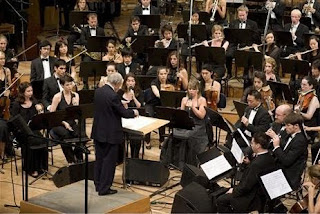

Pierre Boulez (Montbrison, 1925), the legendary composer, teacher and conductor, French, took leave on Sunday the Lucerne Festival Summer directing young musicians of the Academy's Festival. The artist, who at 85 years is in full swing and form, gave an unforgettable concert. Photos © Lucerne Festival.
Boulez, baptized by Dmitri Shostakovich as Archiapóstol of Modernism, is the
Boulez conducted several concerts at the festival with his works, like Igor Stravinsky, Elliott Carter, the Second Viennese School (Arnold Schoenberg, Anton Webern Alban Berg), Gustav Mahler and the young Dieter Ammann, composer in residence at the festival this year.
Sunday's concert began with 'Figures-Doubles-prisms' , his work of the late 50's and early 60's. Throughout the interpretation reigned a disturbing confusion heightened with the force of percussion instruments. Using a giant score rarely seen, and instead of his baton two hands, led the musicians with gestures safe and calm, like saving energy and effort.


_Priska_Ketterer-f2+Lucerne+Festival+4.jpg)
The second part was the Mahler's Sixth Symphony. The twist was a bit rough, a return to convention, by the kind of orchestration, and dominated by stringed instruments (violins, violas, cellos and basses) - and more harmonic content. The Sixth Symphony, Mahler premiered at the German steel town of Essen in 1906, was launched (Allegro energetic) with cellos and basses in permanent martial tone, which prepared the pace for the second theme (Scherzo), a "outpouring of unbridled romance, a love song in honor of Alma [his wife]," as described by Alex Ross in his book Eternal Noise (2009). The final theme was a return to the martial tone and the last movement was a resounding beat of the drums, which connects with the sustained applause of the public. Top , Boulez working with musicians from the Academy of the Festival. Photos © Lucerne Festival.
The break with tradition
 Pierre Boulez embodies the break with musical tradition, the liberation of the concepts and rigid models, and the pursuit of absolute freedom to create. Personality easy. An intellectual and demanding teacher, a prolific songwriter and a respected bandleader. His music has set standards and is a reference today. Your browser does instinct had its limits. His compositions from the first stage are loaded with violence and shock, which he considers necessary to break with the established. Over the years his work has been calming down and finding their own harmony. Photo © BBC.
Pierre Boulez embodies the break with musical tradition, the liberation of the concepts and rigid models, and the pursuit of absolute freedom to create. Personality easy. An intellectual and demanding teacher, a prolific songwriter and a respected bandleader. His music has set standards and is a reference today. Your browser does instinct had its limits. His compositions from the first stage are loaded with violence and shock, which he considers necessary to break with the established. Over the years his work has been calming down and finding their own harmony. Photo © BBC. It was first studied mathematics, then moved to the music and took classes with two teachers in time: the Frenchman Olivier Messiaen (1908-1992) and Polish René Leibowitz (1913-1972), who was a student member of the Second Viennese School. Messiaen and Leibowitz
introduced him to the techniques of atonality and the twelve-tone, both used extensively in the 1950's, among others, by Boulez, Luciano Berio, and Stravinsky. But Boulez did not stop there, continued to explore until the serialism (which combines notes, rhythms, dynamics, attacks, and more) and then surpass it, because he considered only the transition to something else. Some of his known compositions are: Sonata for Piano No. 1, Le Visage nuptial, Le Soleil des eaux, Le Marteau sans maitre, Poésie pour pouvoir, Rituel in memoriam Maderna, Memoriale .
As a musician and composer has fought almost every contemporary masters, as a conductor has tried to reconcile, and in some cases, has specialized in works of Schoenberg, Stravinsky, Webern and Edgar Varèse. It is also a promoter of other composers of his time and has premiered works by Berio, Karlheinz Stockhausen, Carter, Olga Neuwirth, York Höller, and Frank Zappa, among others. It is one of the pioneers in hosting electronic music and computer.
in Paris in 1970 created the Institute for Research and Coordination Acoustics / Music (IRCAM), an underground laboratory of electronic music would class as one, at the invitation of French President Georges Pompidou. He stood at the head of this institution for more than two decades.
came to the musical direction by chance, when he had to do a replacement, and liked it. It was the successor to Leonard Bernstein at the New York Philharmonic (1971-1977) and director of the BBC Symphony Orchestra (1971-1974), in addition to having traveled to other major orchestras.
has received several awards, including Theodor W. Prize Adorno (Germany), the Polar Music Prize, the Royal Swedish Academy of Music and the prestigious Glenn Gould Prize.
0 comments:
Post a Comment